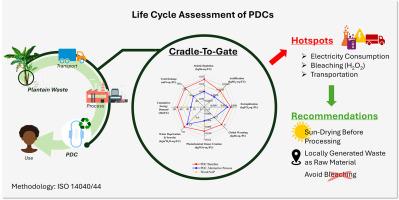芭蕉废弃物环保卫生吸附剂的环境影响评价
IF 10
1区 环境科学与生态学
Q1 ENGINEERING, ENVIRONMENTAL
引用次数: 0
摘要
本研究进行了从摇篮到大门的生命周期评估(LCA),以加纳阿散蒂地区的小规模工业生产为重点,调查大蕉衍生吸收性核心(PDCs)对卫生产品的环境影响。该分析确定了环境热点,评估了对生产变量的敏感性,并将PDCs与传统的木材/高吸水性聚合物(SAP)替代品进行了比较,符合ISO 14040/ 14044标准。评价结果表明,材料制备阶段是主要的环境热点,对非生物资源消耗的贡献率为63.4%,对累积能源需求的贡献率为75.1%,对高用电量造成的全球变暖的贡献率为71.3%。LCA表明,目前的PDC生产过程对环境的影响高于传统的木材/SAP岩芯,其温室气体排放量是传统的1.5倍,每个功能单位的能耗是传统的3.2倍。然而,敏感性分析表明,通过工艺优化,PDCs具有显著的环境改善潜力。这种优化包括在生产前对生物质进行预干燥,避免使用漂白化学品,例如,可以将全球变暖潜势降低约30%。从这项工作中获得的见解可以指导以植物为基础的吸收性核心的更可持续生产实践的发展,为未来的环境评估提供信息,并支持旨在减少卫生产品生态足迹的政策或行业决策。本文章由计算机程序翻译,如有差异,请以英文原文为准。

Environmental impact assessment of eco-friendly sanitary absorbents made from plantain waste
This study conducts a cradle-to-gate life cycle assessment (LCA) to investigate the environmental impacts of plantain derived absorbent core (PDCs) for sanitary products, focusing on small scale industrial production in Ghana's Ashanti Region. The analysis identifies environmental hotspots, evaluates sensitivity to production variables and compares PDCs with conventional wood/superabsorbent polymer (SAP) alternatives, adhering to ISO 14040/14,044 standards. The assessment reveals that, the material preparation stage is the primary environmental hotspot contributing 63.4 % to abiotic resource depletion, 75.1 % to cumulative energy demand, and 71.3 % to global warming due to high electricity consumption. The LCA indicates that the current PDC production process has a higher environmental impact than conventional wood/SAP cores, with 1.5 times higher global warming emissions and consuming 3.2 times greater energy consumption per functional unit. However, sensitivity analysis suggests that PDCs have significant potential for environmental improvement through process optimization. This optimization, involving pre-drying the biomass ahead of manufacturing and avoiding the use of bleaching chemicals, could, for instance, reduce global warming potential by ∼30 %. Insights from this work can guide the development of more sustainable production practices for plant-based absorbent cores, inform future environmental assessments, and support policy or industry decisions aimed at reducing the ecological footprint of hygiene products.
求助全文
通过发布文献求助,成功后即可免费获取论文全文。
去求助
来源期刊

Journal of Cleaner Production
环境科学-工程:环境
CiteScore
20.40
自引率
9.00%
发文量
4720
审稿时长
111 days
期刊介绍:
The Journal of Cleaner Production is an international, transdisciplinary journal that addresses and discusses theoretical and practical Cleaner Production, Environmental, and Sustainability issues. It aims to help societies become more sustainable by focusing on the concept of 'Cleaner Production', which aims at preventing waste production and increasing efficiencies in energy, water, resources, and human capital use. The journal serves as a platform for corporations, governments, education institutions, regions, and societies to engage in discussions and research related to Cleaner Production, environmental, and sustainability practices.
 求助内容:
求助内容: 应助结果提醒方式:
应助结果提醒方式:


